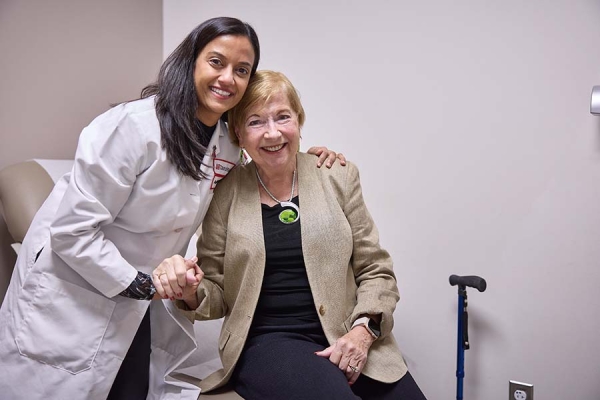Cheri H. has pulmonary arterial hypertension (PAH) — a serious disease that causes high blood pressure in the lungs — but you’d hardly know it. Cheri, who is in her 70s, doesn’t have the typical symptoms of PAH, a fact she credits to her highly specialized Temple Health team.
Surprise diagnosis
It all started about six years ago at a routine checkup. After listening to her heart, Cheri’s primary care doctor had concerns. He referred Cheri to a cardiologist, who suspected PAH. PAH causes the small arteries in the lungs to narrow. This reduces blood flow from the right side of the heart to the left side of the heart. This forces the heart to work harder to pump blood, but eventually the heart muscle becomes weak. Over time, this strain on the heart can lead to right heart failure.
I couldn’t believe I had that, I’m so glad they sent me to the cardiology team at Temple.
Shortness of breath is one of the common symptoms of PAH. Others include fatigue, swelling of the feet and legs, dizziness and fainting spells, chest pain, or a fast heartbeat.
PAH is a relatively rare disease, but underdiagnosed and most often, recognized late. Much of the time, the cause of PAH is unknown, but often it is associated with several other common conditions. PAH is chronic and progressive, meaning it doesn’t go away and it usually gets worse over time. There is no cure. But treatments can ease PAH symptoms, improve quality of life, and help slow the progress of the disease.
Coming to Temple for specialized care
Learning you have a serious disease is never easy, but Cheri’s diagnosis came with some good news. Her cardiologist knew about a leading expert in PAH: Anjali Vaidya, MD, FACC, FASE, FACP, Co-Director of the Pulmonary Hypertension Program at Temple.
“Her credentials are incredible,” Cheri says. “We researched and saw her experience and said, ‘Oh, my gosh, this is really great.’
Dr. Vaidya confirmed Cheri’s PAH diagnosis — and reassured her that treatment could help control the condition.
“She said, ‘You will have it for the rest of your life, but it will not end your life,’” Cheri recalls. “And I said I could live with that.”
Cheri’s treatment plan includes several effective medications. Two relax the blood vessels to support lung circulation and ultimately treat and reverse right heart failure.
Dr. Vaidya recently added a third medication to Cheri’s treatment plan that also helps to control its impact on her health and quality of life. The promising treatment was just recently approved by the U.S. Food and Drug Administration, and Cheri takes it by injection every three weeks. This medication directly works to reverse the stiffness and thickening of the circulation and slow down, or even reverse, the progression of PAH.
“It’s a small needle, so I don’t even feel it,” Cheri says.
Cheri sees Dr. Vaidya regularly to monitor her PAH and check on how she’s doing with her medications. She has bloodwork done and undergoes a few tests, including an echocardiogram.
Cheri says she can reach out to her Temple Cardiology team anytime she has a question about her medication or PAH. She also receives excellent care and support from a nurse in the program, Lori A. Warren, RN.
